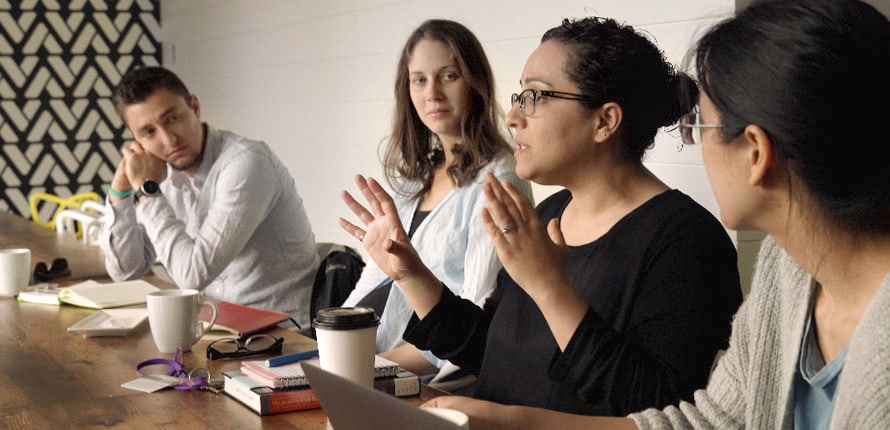Search for academic programs, residence, tours and events and more.
Our world faces pressing questions of global justice in relation to armed conflict, human migration, economic inequality and environmental change. To understand and address these issues, no single disciplinary perspective suffices. The MA in Global Justice, Religion and Culture is an exciting unique program that offers you a crucial interdisciplinary space for reflection on how religion intersects with these global issues.
Alongside questions of policy, the program fosters critical analysis of cultural and religious processes as well as their political implications in a globalizing world.

Diverse faculty knowledge and expertise.
Transformative learning environment.
Prepares you for life after university.
All students in the MA in Global Justice, Religion and Culture begin with two semesters of coursework. This requires the completion of two core theory courses (GJRC693 in fall and GJRC694 in winter), a Colloquium requirement (GJRC690 spread over fall and winter), and 1.5 credits in GJRC elective courses.
Thereafter, each student will follow one of four program options:
The 12-Month MRP option remains the most popular program option and requires the completion of a Major Research Project supervised by a professor in Global Studies or Religion and Culture. Completion of the MRP includes an assessment of both the written component and the oral defence.
Students who wish to pursue the Internship Option for their degree must first obtain agreement from a program faculty member to supervise their completion of GJRC697: Supervised Internship. Internships may be conducted in Canada or abroad, and will be related to students’ topic of research for GJRC697: Supervised Internship.
The 16-Month Internship Option includes an Internship which will normally be conducted during the Spring semester and lead to a 16-month MA program, with no funding offered during the second Fall Term, during which the student writes their internship-informed MRP. Students who choose to pursue the internship option can speak with the Graduate Coordinator if they wish to complete the program in 12 months, instead of 16.
To pursue the internship option, students must submit a cover letter providing information on the internship program under consideration and a resume to the Graduate Coordinator for approval by the end of the fourth week of the winter term. Students return after the internship to complete RE697: Supervised Internship, an internship-informed MRP and defence.
Note: Internal funding is typically only available for the first year; students thinking of completing the two-year thesis option or sixteen-month internship option should have alternate funding (e.g. hold an external scholarship such as SSHRC or have assured research assistantship funding from their supervisor) for their additional term or second year.
A full-time, two-year, thesis-based option is available for those who wish to pursue a topic in greater depth. In the thesis option (in place of the major research project), students complete a thesis proposal by the end of their first year, and in the second year complete a thesis and an oral defence.
Note: Internal funding is typically only available for the first year; students thinking of completing the two-year thesis option or a sixteen-month internship option should have alternate funding (e.g. hold an external scholarship such as SSHRC or have assured research assistantship funding from their supervisor) for their second year.
Our faculty, drawn from Laurier’s departments of Religion and Culture and Global Studies, are specialists in disciplines across the social sciences and humanities and conduct research around the world. We bring our diverse knowledge and expertise into the classroom and to our student supervision to foster transformative learning and the spirit of free inquiry.
The interdisciplinary nature of the Master of Arts (MA) in Global Justice, Religion and Culture program prepares you to move into professional arenas within and outside of academia, such as:
We encourage you to interrogate conventions and develop new modes of ethical engagement. In doing so, we seek to cultivate the critical skills and the knowledge that you need to succeed both within and beyond the university.
We also offer a PhD in Religious Studies.
Domestic students in the GJRC program are automatically given the opportunity to work as Teaching Assistants (TAs). This opportunity is optional. Being a TA involves grading assignments/test/exams, leading small-group tutorial discussions, clarifying concepts for students, and acting as a role model and mentor. The position is challenging, enriching, and provides the opportunity to build a whole slate of skills for future employment in business, government, and the non-profit sector.
For example, TAs problem-solve, contribute to tutorial design—in collaboration with professors—and build emotional intelligence through interactions with their students, cohorts, and faculty. GJRC students, therefore, develop skills in:
The Colloquium requirement (GJRC690) is completed over the fall and winter terms. There are various possibilities by which to fulfil the requirement, including:
Credit for the Colloquium is on pass/fail basis, and includes submission of written reflections on each event/workshop/internship, etc.
For Thesis Option:
For 12-Month and 16-Month Internship Options:
For 12-Month MRP Option:
Note: not all elective courses are offered each year.

"My year-long master’s program at Laurier was one of the most exciting and exhilarating experiences of my life. I gained true and lasting friendships, engaged in mentorship with world-class academics, had a fulfilling extracurricular life, and was able to truly explore my academic interests in well-curated and engaging classes."
Shifa Abbas (GJRC MA '19)
Take the first step in your graduate education and apply to one of our graduate programs. Follow our three-step admission process — we’ll walk you through how to apply and prepare for your first day as a graduate student.
The first round of applications is considered in early January. Thereafter, applications will continue to be considered until the program is full. If applying after the first phase of applications is considered in early January, consult the graduate coordinator directly to enquire about further openings in the program. We have had a significant amount of interest in our program during the past two years, so we strongly encourage prospective students to apply prior to the deadline.
After you have submitted your OUAC application, paid the non-refundable application fee, and Laurier has received your application, you'll receive an email from gradadmissions@wlu.ca advising you to upload the additional required documentation to Laurier’s Online Registration and Information System (LORIS).
Please note, the application process and the uploading of supplemental documentation, which includes references, typically takes two weeks. To avoid disappointment, apply early.
An application for admission to our MA in Global Justice, Religion and Culture must include:
Visit our Graduate Admissions Toolkit for more information about applying.
Proficiency in written and spoken English is essential to graduate studies at Laurier. Applicants whose language of instruction during their previous postsecondary education was not in English must submit evidence of proficiency in English. If applicable, results from accepted testing services must be uploaded to LORIS.
Questions? Contact Meena Sharify-Funk, graduate coordinator, at msharifyfunk@wlu.ca or 548.889.5144. For general inquiries, contact Kirsten Pries at kpries@wlu.ca or 548.889.5141.

"[The] professionalization component allowed me to gain experience in networking and organizing. This included coordinating and hosting a conference with two high-profile keynote speakers and panels in which students were able to present their work."
Fatima Chakroun, (RCGJ MA '19)
Regardless of the type of graduate degree program you intend to pursue, financial planning is important. At Laurier, we want to provide you with as much information as possible about a variety of scholarship and funding opportunities and equip you with the skills to manage your finances effectively in the years to come.

The MA in Global Justice, Religion and Culture would be a particularly good fit for candidates who contemplate pursuing further graduate studies (e.g. doctoral studies or professional programs in public policy or social work) or seeking employment in the NGO sector (e.g. nonprofit advocacy and organization: community development, refugee settlement, arts and culture) or education or journalism sectors.
Our graduates have gone on to work in education, research, business and social services. Examples of jobs held by our graduates include:
ASPIRE is Laurier's professional skills development training program for graduate students. The program helps you craft an individualized, extracurricular learning plan tailored to your professional journey and entry to the workplace.
Learn about the interests of our faculty members. If you are looking for more information about this program, have questions, or want to set up a meeting, contact a member of our team.
Abderrahman Beggar
Professor
Kevin Burrell
Associate Professor
Undergraduate Advisor
Timothy Donais
Associate Professor
Carol B. Duncan
Professor
3M National Teaching Fellow
John Boye Ejobowah
Associate Professor
Erich Fox Tree
Associate Professor
Chair, Department of Religion and Culture
Alex Latta
Associate Professor
Ashley Lebner
Associate Professor
Jason Neelis
Associate Professor
Edmund Pries
Professor
Meena Sharify-Funk
Professor
MA Coordinator and PhD Director
Stacey Wilson Forsberg
Associate Professor
Ali Hassan Zaidi
Associate Professor
Jasmin Zine
Professor